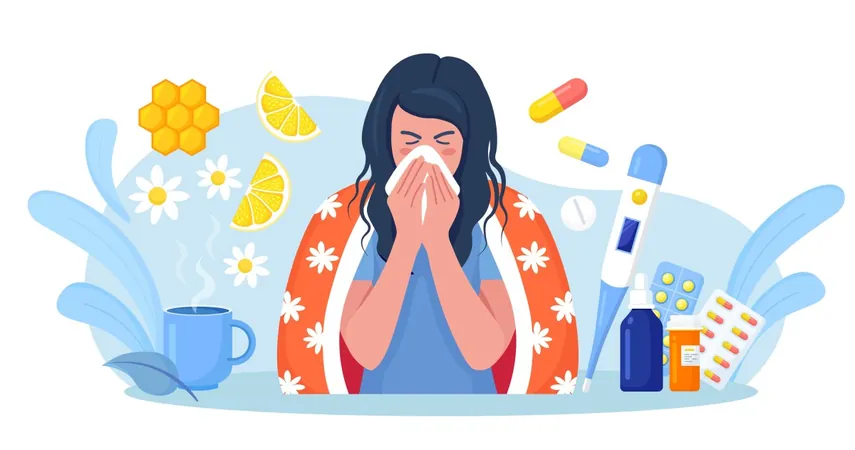
Why Your Cough Medicine Might Be Doing More Harm Than Good – What You Need to Know!
2024-12-10
Author: Jessica Wong
As the temperatures drop, so does our resistance to pesky viruses that unleash a wave of coughing and sneezing. With pharmacies bustling with travelers seeking relief, many are dismayed to find that the remedies lining the shelves may not be as effective as advertised—especially when it comes to common cough and cold medications.
The Truth About Common Cold Medications
The reality is that many over-the-counter options do little to alleviate the discomfort associated with cold symptoms. Some medications are effective, but the majority simply don’t live up to their claims. While you may be tempted to reach for a syrup or capsule, here’s a breakdown of what to actually consider when seeking relief.
Prevention is Key!
Most common cold symptoms arise from viruses for which we lack effective cures. However, vaccines for COVID-19 and the flu are available, along with immunizations for RSV that can protect vulnerable populations. Testing can help identify these illnesses, enabling targeted treatments like Tamiflu and Paxlovid that may reduce the severity of symptoms. Take proactive steps to fend off infections by practicing good hygiene, using air filtration, wearing masks in crowded spaces, and steering clear of sick individuals.
Navigating Cold Medicines: What Works?
While not everyone needs medication to battle a cold, many individuals do seek relief from persistent symptoms. Here’s a concise guide on choosing remedies wisely:
- Pain and Fever Relief: Medications like acetaminophen (Tylenol) and ibuprofen are effective at managing aches, pains, and fevers resulting from colds. They can also help improve overall comfort, allowing for a more restful recovery.
- Decongestants: Pseudoephedrine (found in Sudafed) is currently the go-to decongestant for relieving nasal congestion caused by colds. However, it’s important to remember that this may be kept behind the pharmacy counter due to its potential misuse. Pseudoephedrine may also work better in combination with antihistamines, although these should be chosen carefully.
- Nasal Sprays: Options like saline sprays or nasal irrigation can provide significant relief from congestion, as can prescription inhalers like ipratropium bromide.
- Cough Syrups: Despite their popularity, studies suggest that common cough suppressants, such as dextromethorphan, offer limited effectiveness. Caution is advised especially for young children, where potential side effects can outweigh benefits.
Natural Alternatives: Honey, Zinc, and Vitamin C
For those looking beyond traditional medications, natural remedies can provide relief:
- Honey: Studies indicate that honey can reduce nighttime coughing more effectively than conventional cough syrups. However, steer clear of honey for children under one year due to the risk of botulism.
- Zinc and Vitamin C: Some evidence points to zinc shortening the duration of cold symptoms, though unpleasant side effects may dissuade many users. Vitamin C may also offer benefits, especially for active individuals.
Effective Home Remedies for Cold Symptoms
You don’t have to rely solely on medications; several home strategies can alleviate symptoms.
- Proper Rest: Elevating your head while sleeping can significantly ease nighttime congestion and allow for better airflow. Maintaining adequate sleep is crucial in bolstering your immune system during illness.
- Stay Hydrated: Drinking plenty of fluids keeps your throat and airways moist, which can mitigate discomfort.
When to Seek Help
While most cold symptoms peak within a few days and typically improve, persistent or severe symptoms may warrant medical attention. If you have a fever lasting more than three days, difficulty breathing, or severe fatigue, consult a healthcare professional promptly. It's crucial to differentiate between viral infections, allergic reactions, or even bacterial infections that require alternative treatment strategies.
Don’t let your cold drag you down! Arm yourself with knowledge about safe and effective treatments, while also taking preventative actions to protect yourself and others this cold season. Stay informed, stay healthy!

 Brasil (PT)
Brasil (PT)
 Canada (EN)
Canada (EN)
 Chile (ES)
Chile (ES)
 Česko (CS)
Česko (CS)
 대한민국 (KO)
대한민국 (KO)
 España (ES)
España (ES)
 France (FR)
France (FR)
 Hong Kong (EN)
Hong Kong (EN)
 Italia (IT)
Italia (IT)
 日本 (JA)
日本 (JA)
 Magyarország (HU)
Magyarország (HU)
 Norge (NO)
Norge (NO)
 Polska (PL)
Polska (PL)
 Schweiz (DE)
Schweiz (DE)
 Singapore (EN)
Singapore (EN)
 Sverige (SV)
Sverige (SV)
 Suomi (FI)
Suomi (FI)
 Türkiye (TR)
Türkiye (TR)
 الإمارات العربية المتحدة (AR)
الإمارات العربية المتحدة (AR)